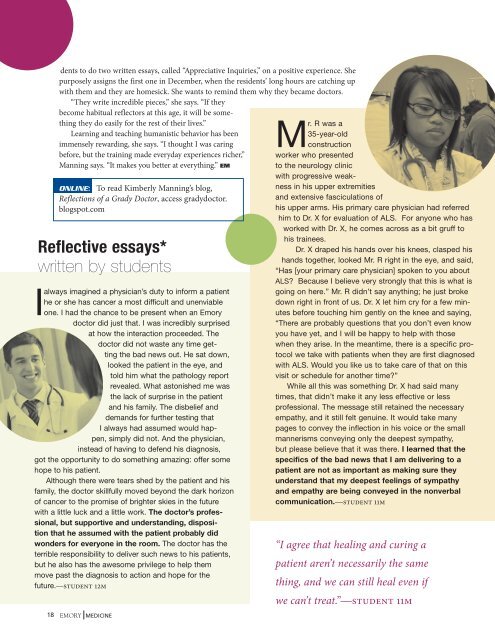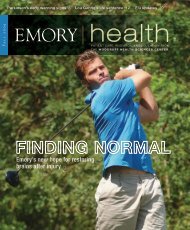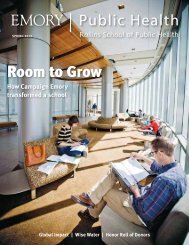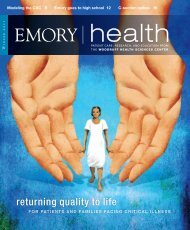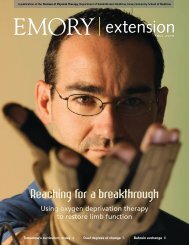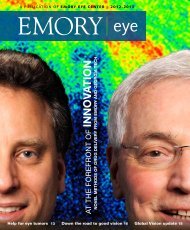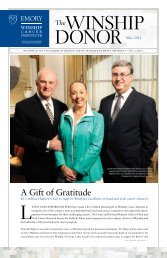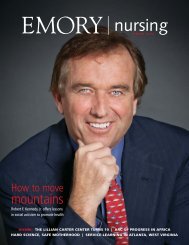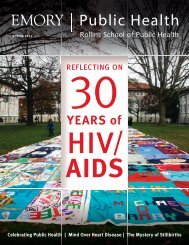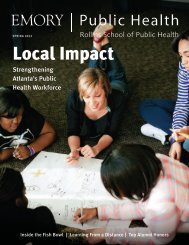medicine - Woodruff Health Sciences Center - Emory University
medicine - Woodruff Health Sciences Center - Emory University
medicine - Woodruff Health Sciences Center - Emory University
You also want an ePaper? Increase the reach of your titles
YUMPU automatically turns print PDFs into web optimized ePapers that Google loves.
18<br />
dents to do two written essays, called “Appreciative Inquiries,” on a positive experience. She<br />
purposely assigns the first one in December, when the residents’ long hours are catching up<br />
with them and they are homesick. She wants to remind them why they became doctors.<br />
“They write incredible pieces,” she says. “If they<br />
become habitual reflectors at this age, it will be something<br />
they do easily for the rest of their lives.”<br />
Learning and teaching humanistic behavior has been<br />
immensely rewarding, she says. “I thought I was caring<br />
before, but the training made everyday experiences richer,”<br />
Manning says. “It makes you better at everything.” EM<br />
Online: To read Kimberly Manning’s blog,<br />
Reflections of a Grady Doctor, access gradydoctor.<br />
blogspot.com<br />
Reflective essays*<br />
written by students<br />
I<br />
always imagined a physician’s duty to inform a patient<br />
he or she has cancer a most difficult and unenviable<br />
one. I had the chance to be present when an <strong>Emory</strong><br />
doctor did just that. I was incredibly surprised<br />
at how the interaction proceeded. The<br />
doctor did not waste any time getting<br />
the bad news out. He sat down,<br />
looked the patient in the eye, and<br />
told him what the pathology report<br />
revealed. What astonished me was<br />
the lack of surprise in the patient<br />
and his family. The disbelief and<br />
demands for further testing that<br />
I always had assumed would happen,<br />
simply did not. And the physician,<br />
instead of having to defend his diagnosis,<br />
got the opportunity to do something amazing: offer some<br />
hope to his patient.<br />
Although there were tears shed by the patient and his<br />
family, the doctor skillfully moved beyond the dark horizon<br />
of cancer to the promise of brighter skies in the future<br />
with a little luck and a little work. The doctor’s professional,<br />
but supportive and understanding, disposition<br />
that he assumed with the patient probably did<br />
wonders for everyone in the room. The doctor has the<br />
terrible responsibility to deliver such news to his patients,<br />
but he also has the awesome privilege to help them<br />
move past the diagnosis to action and hope for the<br />
future.—student 12m<br />
EMORY MEDICINE<br />
Mr. R was a<br />
35-year-old<br />
construction<br />
worker who presented<br />
to the neurology clinic<br />
with progressive weakness<br />
in his upper extremities<br />
and extensive fasciculations of<br />
his upper arms. His primary care physician had referred<br />
him to Dr. X for evaluation of ALS. For anyone who has<br />
worked with Dr. X, he comes across as a bit gruff to<br />
his trainees.<br />
Dr. X draped his hands over his knees, clasped his<br />
hands together, looked Mr. R right in the eye, and said,<br />
“Has [your primary care physician] spoken to you about<br />
ALS? Because I believe very strongly that this is what is<br />
going on here.” Mr. R didn’t say anything; he just broke<br />
down right in front of us. Dr. X let him cry for a few minutes<br />
before touching him gently on the knee and saying,<br />
“There are probably questions that you don’t even know<br />
you have yet, and I will be happy to help with those<br />
when they arise. In the meantime, there is a specific protocol<br />
we take with patients when they are first diagnosed<br />
with ALS. Would you like us to take care of that on this<br />
visit or schedule for another time?”<br />
While all this was something Dr. X had said many<br />
times, that didn’t make it any less effective or less<br />
professional. The message still retained the necessary<br />
empathy, and it still felt genuine. It would take many<br />
pages to convey the inflection in his voice or the small<br />
mannerisms conveying only the deepest sympathy,<br />
but please believe that it was there. I learned that the<br />
specifics of the bad news that I am delivering to a<br />
patient are not as important as making sure they<br />
understand that my deepest feelings of sympathy<br />
and empathy are being conveyed in the nonverbal<br />
communication.—student 11m<br />
“I agree that healing and curing a<br />
patient aren’t necessarily the same<br />
thing, and we can still heal even if<br />
we can’t treat.”—student 11m


